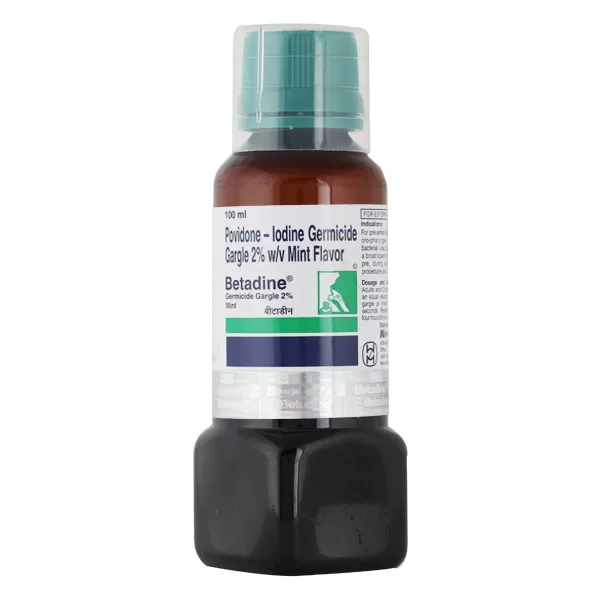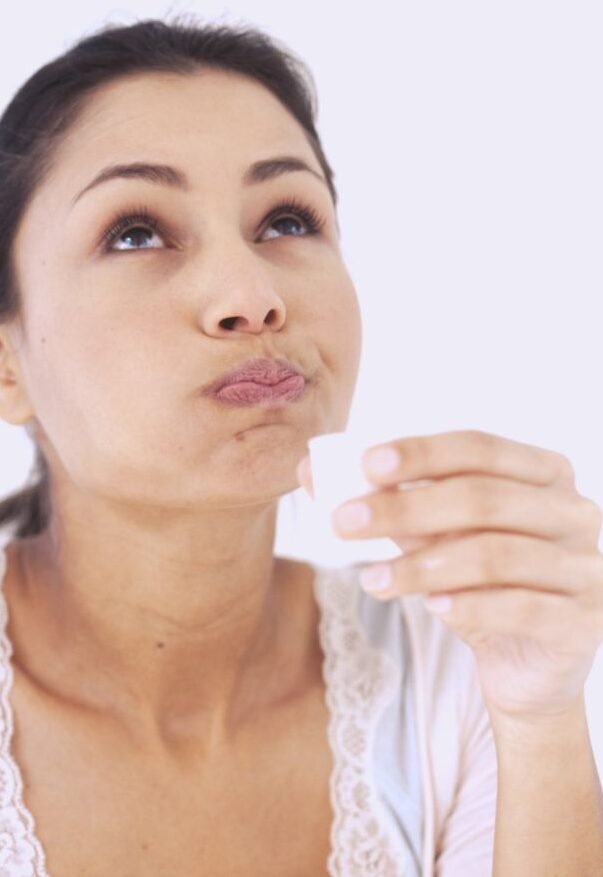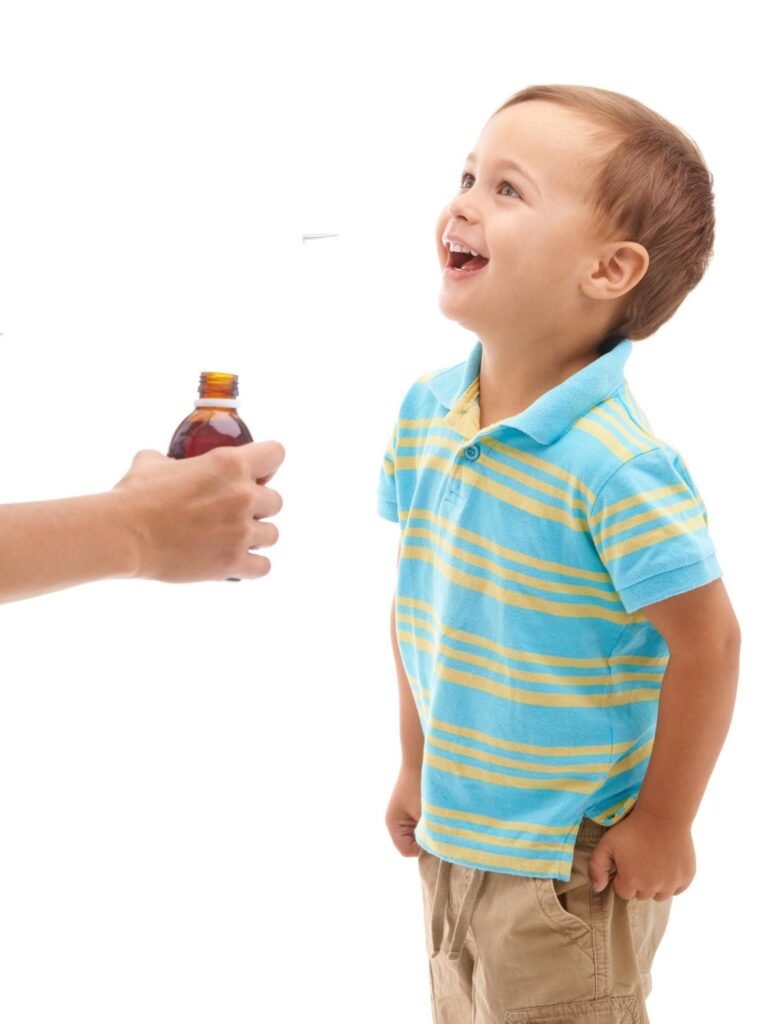Click to call
Betadine Mouthwash
Betadine 2% Mouthwash is a commercially available oral antiseptic solution that contains povidone-iodine as its active ingredient. Povidone-iodine is a chemical complex involving iodine and is renowned for its robust antiseptic properties. The primary use of Betadine 2% Mouthwash is to support oral hygiene and address a range of oral conditions.

Indications:

- Maintaining Oral Cleanliness:Betadine 2% Mouthwash combats and hinders the growth of microorganisms, including bacteria, within the mouth. This serves to decrease the risk of infections and enhance overall oral hygiene.
- Relief for Sore Throats and Oral Ailments:Individuals grappling with discomfort from conditions like sore throats, mouth ulcers, or other oral infections may find relief through Betadine. Its antiseptic attributes, derived from povidone-iodine, can soothe discomfort and foster the healing process.
- Enhancing Dental Procedure Safety:Dentists often utilize Betadine 2% Mouthwash to sterilize the oral cavity before specific dental treatments, such as tooth extractions or oral surgeries. It is also valuable post-procedure for minimizing the potential for infections.
- Treating Oral Thrush:As a prescription option, it can effectively manage oral thrush, a fungal infection initiated by Candida yeast.
- Managing Gum Health: In certain instances, it may be advised for addressing conditions related to gum health, including gum inflammation (gingivitis) and more severe gum diseases like periodontitis.
How should i use Betadine Mouthwash?
- Dilution: Sometimes, you might need to mix Betadine 2% Mouthwash with water. Think of it like making a safe and gentle potion. Usually, it’s a one-to-one mix, like using one part mouthwash and one part water. Just make sure to follow the instructions for the right mix.
- Rinsing:After you’ve mixed it (if needed), simply take a sip of the mixture and swish it around in your mouth.
- Swish and Gargle:Pretend you’re giving your mouth a tiny spa treatment. Swish the liquid around for about 30 seconds to a minute. If your throat is bothering you, you can also gargle with it gently.
- Spit It Out:When you’re done swishing and gargling, spit it out into the sink. Don’t swallow it; that’s important!
- Frequency:How often you use it depends on what your mouth needs and what your healthcare helper suggests. Usually, it’s like brushing your teeth – two or three times a day. But, always listen to your healthcare friend for your special plan.
- Wait a Bit:After using the mouthwash, it’s like waiting for magic to happen. Try not to eat or drink anything for about 30 minutes. This gives the mouthwash time to do its job.
- Be Mindful of Staining: Sometimes, the mouthwash can make your teeth or mouth look a little different for a short while. It’s like a colorful art project. Don’t worry; it usually goes away and you can help by brushing your teeth and taking good care of your mouth

Can betadine Mouthwash be used in Children?
- Watch Closely:Always keep a close eye on your child when they’re using Betadine mouthwash to make sure they don’t accidentally swallow it. Stay vigilant during their rinsing routine.
- Get Expert Advice:Before you decide to use Betadine mouthwash for your child, it’s wise to consult a healthcare expert such as a pediatrician or dentist. They can give you personalized guidance on whether it’s the right choice for your child’s specific oral health needs.
- Be Aware of Potential Risks:Remember that excessive absorption of iodine, a component of Betadine mouthwash, can lead to thyroid problems, which are particularly concerning in children. To safeguard your child’s health, strictly adhere to the recommended usage instructions.
- Follow the Right Dose and Mix:If a healthcare professional suggests Betadine mouthwash for your child (typically for kids aged 6 or older), make sure to follow their instructions precisely. This includes using the correct amount and mixing it properly. Children might need a milder concentration than adults.
- Consider Your Child’s Age:Keep in mind that Betadine mouthwash is generally not suitable for very young children, like infants and toddlers, unless your child’s doctor specifically recommends it. Think about age-appropriate alternatives for maintaining your child’s oral hygiene and addressing any oral health issues.

How often should Betadine Mouthwash be used?

Frequency of using Betadine mouthwash should align with the specific instructions provided by a healthcare professional or as indicated on the product label. Generally, it’s important to follow these guidelines: –
- Talk to Your Oral Health Expert:If you’re dealing with a specific oral health problem or have questions, it’s a good idea to reach out to your dentist or healthcare provider. They can give you personalized advice on how often you should use Betadine mouthwash, tailored to your unique situation.
- Read the Label Carefully:Take a moment to carefully read the product label and any accompanying information that comes with the Betadine mouthwash. This information usually provides clear instructions on how to use it properly.
- Consider Short or Long-Term Use:Depending on your needs, you may use Betadine mouthwash for a short period, like a week, to address a specific issue, or you might incorporate it into your daily oral care routine for the long term.
- Understand Common Usage:In typical situations, people often use Betadine mouthwash two to three times a day. However, keep in mind that this can vary. For instance, if you’re dealing with a sore throat, your healthcare provider may suggest more frequent use.
- Trust Your Healthcare Expert:Always rely on the guidance of your dentist or healthcare provider when it comes to how often and for how long you should use Betadine mouthwash. They’ll take into account your unique needs and any potential concerns to ensure it’s used effectively and safely.
Can pregnant or breastfeeding women use Betadine mouthwash?

Pregnancy:
When you’re pregnant, it’s always a good idea to chat with your doctor about any new products or treatments, like Betadine mouthwash. Here’s why:
- Safety First:We want to make sure everything you use is safe for you and your baby. Betadine mouthwash hasn’t been studied as much during pregnancy, so we need to be extra cautious.
- Benefits and Risks:Your doctor can help weigh the pros and cons. They’ll consider why you want to use Betadine mouthwash and whether there might be safer alternatives for your oral care during pregnancy.
Breastfeeding:
If you’re breastfeeding, here’s what you should know:
- Not Much Gets In:When you use Betadine mouthwash as a mouthwash (not swallowing it), very little of it usually gets into your bloodstream.
- Be Careful:But, to be super safe, avoid any chance of it coming into contact with your breast or nipple area. We want to make sure your baby only gets the good stuff from your milk.
- Ask the Experts:If you’re still unsure or worried, talk to a lactation specialist or your healthcare provider who knows about breastfeeding. They can give you advice that’s just right for you and your baby.
Remember, your healthcare team is here to help you make the best choices for you and your little one. It’s all about keeping you both safe and healthy!
